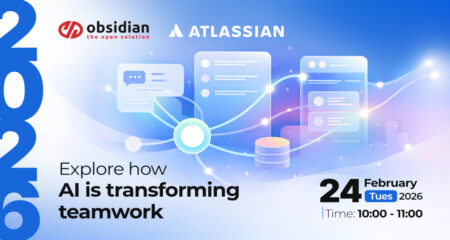 Obsidian Systems, in collaboration with Atlassian, recently hosted a dynamic “Snack and Learn” session for C-level executives, showcasing the transformative potential of AI in IT service management (ITSM).
Obsidian Systems, in collaboration with Atlassian, recently hosted a dynamic “Snack and Learn” session for C-level executives, showcasing the transformative potential of AI in IT service management (ITSM).
This engaging event focused on exploring Jira Service Management (JSM) and its evolving capabilities, particularly with AI-powered tools like Atlassian Rovo. Through interactive presentations, the session delved into how AI-driven automation, analytics and enhanced reporting in JSM can reshape IT service delivery, making it more efficient, proactive and customer focused.
The discussion highlighted the practical advantages of AI in ITSM, from automating routine tasks to streamlining decision-making processes, and examined real-world use cases of Rovo to demonstrate the tangible impact of AI in action.
Attendees also explored the potential challenges in adopting AI – such as data governance and security considerations – and how to prepare IT teams for evolving roles as AI integrates further into ITSM environments. As businesses seek to enhance operational efficiencies and customer satisfaction, AI tools like Rovo present exciting opportunities to reimagine ITSM’s role in supporting organisational goals. This synopsis covers the core themes and key takeaways shared during the session.
Analytics and reporting capabilities in Jira Service Management
Analytics and reporting in JSM form the backbone of data-driven decision making in ITSM, providing organisations with actionable insights to improve service delivery and manage operational efficiency. These tools allow teams to track key performance indicators, understand service trends and analyse customer satisfaction data.
Attendees explored the breadth of Atlassian Analytics within JSM, a feature that enables the integration of data from multiple sources into a single dashboard. Participants noted that these capabilities equip IT teams with visibility into service requests, helping them prioritise actions that enhance user experience and optimise team workloads. Moreover, the ability to customise reports offers a flexible approach, allowing organisations to align JSM insights with broader business objectives.
 The session emphasised how such analytics empower IT leaders to proactively identify issues, assess the impact of service changes and streamline resource allocation. With these data-rich insights, businesses can detect patterns that guide future strategic decisions, ultimately leading to improved customer satisfaction and operational efficiency.
The session emphasised how such analytics empower IT leaders to proactively identify issues, assess the impact of service changes and streamline resource allocation. With these data-rich insights, businesses can detect patterns that guide future strategic decisions, ultimately leading to improved customer satisfaction and operational efficiency.
The transformative potential of AI in ITSM
AI’s role in ITSM has grown significantly, with capabilities extending beyond traditional automation. Within JSM, AI allows IT teams to automate repetitive tasks, such as categorising requests or initiating workflows. This allows teams to focus on complex problem solving, a shift that enhances service quality while maintaining high responsiveness.
The discussion highlighted how AI assists IT teams by not only saving them time but also increasing the accuracy of responses. Automated categorisation and assignment of tickets, for instance, ensures that requests reach the right personnel swiftly, reducing wait times and resolving issues faster. AI further enhances decision making through predictive analytics, helping IT managers forecast demands and adjust resource allocation in anticipation of issues.
Participants were intrigued by how these capabilities transform service management, creating a smoother, more consistent experience for end users. As organisations look to scale, AI-integrated ITSM allows them to do so without compromising on service quality.
Addressing challenges and considerations
Integrating AI within ITSM comes with challenges that require careful planning and change management. The session addressed key obstacles, including the need for data readiness, cybersecurity concerns and balancing AI-driven efficiencies with human oversight.
One prominent consideration is data quality. For AI to operate effectively, organisations must ensure that data within JSM is accurate, relevant and timely. The Obsidian team emphasised the importance of data governance frameworks to maintain data integrity and maximise AI’s potential within ITSM. Security was another focal point, as the introduction of AI and automation could potentially expose systems to new risks. Regular assessments and monitoring protocols are therefore essential to prevent vulnerabilities.
 Lastly, while AI holds significant advantages, the session stressed the importance of human intervention to address complex issues that require judgment. Attendees appreciated this balanced approach, as it reinforced the idea that AI should augment rather than replace human expertise within ITSM.
Lastly, while AI holds significant advantages, the session stressed the importance of human intervention to address complex issues that require judgment. Attendees appreciated this balanced approach, as it reinforced the idea that AI should augment rather than replace human expertise within ITSM.
Impact on IT professionals
The adoption of AI in ITSM has transformative effects on the roles and responsibilities of IT staff. As AI takes on routine tasks, IT professionals can shift their focus towards strategic functions that drive business outcomes. This evolution in responsibilities positions IT teams as proactive partners within the organisation, leveraging data and analytics to support continuous improvement.
For ITSM roles, AI facilitates new opportunities for upskilling and specialisation. Attendees discussed how IT professionals can now focus on data analysis, IT strategy and customer experience management, areas that bring greater value to the organisation. This shift is a significant career development opportunity for IT staff, as it allows them to engage in more meaningful work that influences organisational strategy.
The session underscored that, as roles evolve, organisations should support IT staff through training and upskilling programmes, allowing them to harness AI effectively. The transition to AI-enhanced ITSM is a chance for IT teams to redefine their roles, contributing to the organisation’s broader digital transformation efforts.
A closer look at AI-powered ITSM with Atlassian Rovo
A highlight of the session was Atlassian Rovo, an AI tool within JSM designed to provide IT teams with innovative, AI-driven capabilities that streamline and enhance ITSM processes. Real-world use cases of Rovo demonstrate how AI can manage complex, multi-stage workflows without sacrificing accuracy or speed.
Rovo’s capabilities include intelligent automation for service requests, predictive analytics to prevent incidents and contextual recommendations for more efficient problem resolution. Attendees noted that such tools simplify service management by making proactive support possible. Instead of merely reacting to service requests, IT teams can anticipate user needs, resolve issues before they escalate and deliver faster, more personalised service.
 The discussion further emphasised the cost benefits of these tools. As Rovo automates a growing number of tasks, IT departments can reduce operational costs while delivering higher service levels. Moreover, Rovo’s intuitive interface ensures that teams can maximise the benefits of AI without the need for extensive technical expertise, making it accessible to organisations at various stages of digital maturity.
The discussion further emphasised the cost benefits of these tools. As Rovo automates a growing number of tasks, IT departments can reduce operational costs while delivering higher service levels. Moreover, Rovo’s intuitive interface ensures that teams can maximise the benefits of AI without the need for extensive technical expertise, making it accessible to organisations at various stages of digital maturity.
The “Snack and Learn” session provided valuable insights into the evolving capabilities of JSM with Atlassian’s AI-driven enhancements. The Obsidian team’s expertise underscored how these tools empower IT professionals, positioning them as strategic enablers within their organisations. As businesses continue to adopt digital-first strategies, AI-powered ITSM solutions like Jira Service Management and Rovo offer organisations the agility needed to keep pace with change and enhance user satisfaction. By embracing these advancements, organisations can anticipate a future where ITSM is not only a support function but a driver of innovation and growth.
TechCentral, Obsidian and Atlassian thank all those who participated in the “Snack and Learn” discussion.
- Read more articles by Obsidian Systems on TechCentral
- This promoted content was paid for by the party concerned




